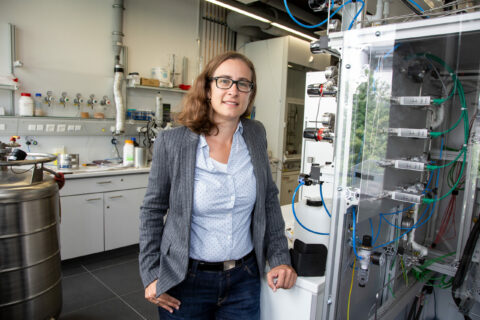Making the impossible possible: ERC Starting Grant for Prof. Tanja Franken
FAU EAM member and EAM Starting Grant awardee Tanja Franken receives over 1.8 million euros from the European Research Council for her research into catalysts.
In the DynaMMO project, Prof. Dr. Tanja Franken is carrying out research into catalysts for dynamic reaction control. Thanks to the project’s major potential for innovation, the FAU professor has now received a starting grant from the European Research Council (ERC) entailing funding of over 1.8 million euros.
“I am passionate about catalysis. Demand is growing for more sustainable processes that either do not yet exist or that do not work well enough to be used in a technical setting. Catalysis is a tool that can help make such processes possible,” says Tanja Franken. When she refers to sustainable processes, the professor is thinking predominantly of processes aimed at saving CO2. These require catalysts that are custom made to suit these procedures, and that is exactly what the researcher plans to develop in her project.
Franken has been a junior professor for Catalytic and Electrocatalytic Systems and Procedures at the Department of Chemical and Biological Engineering at FAU since 2020, and her research focuses on the surface properties of catalysts. “My aim is to develop catalysts that adjust to their external surroundings,” explains Franken. This is not yet possible, which leads to high energy consumption and makes catalysts suffer from wear and tear. The result is that catalysts have to be replaced after a certain period of time. Catalysts that can change their properties to adjust to their surroundings are much more energy efficient. They do not have to be replaced and open up new possibilities, such as manufacturing sustainable fuels and basic chemicals. These can then be integrated into a whole new range of products, ranging from paints and varnishes to adhesives and pharmaceuticals.
Chemistry that changes the world
When asked why she chose to study her subject, Tanja Franken explains, “I really wanted to find out how the world works.” In 2006 she began to study chemistry and passed her doctoral degree with distinction in 2016. Even though her studies were mainly based on theory, for Tanja Franken, chemistry is more than that. She is interested in technical applied chemistry that has a benefit for our world. “I am interested not only in sustainability, but also in new technologies that become possible,” the professor explains. She is therefore especially interested in the interface where catalysis takes place: between chemistry and engineering.
She hopes that her project will make new reactions possible, as was the case in the past when researchers succeeded in transforming CO2 into energy. “While I was studying, this was still just wishful thinking. Now it is a reaction that is largely possible, making a contribution to more sustainability. And that’s what I find so exciting: you really can make a difference!” Franken explains.
Driven by her wish to make a difference, the chemist is now carrying out research at FAU into catalysts: substances that trigger a chemical reaction. “I usually work with mixed metal oxides, in other words oxides that can be found in nature,” Franken explains. These may be various solids, similar in composition to stones. For her project, the researcher is focusing mainly on the surfaces of these solid catalysts, as that is where the actual reaction takes place, at what is known as active centers. Until now, it has been the case that catalysts require greater amounts of energy to carry out the same work the longer they are used. If the active centers could be tailored to suit their future use, this may make reactions more sustainable and energy efficient. “I assemble the solids at the molecular level in such a way that they can become active,” Franken says. Her aim is to develop catalysts that adjust to their reaction settings, meaning that they can be used for future commercial applications.
One example is methanoxidation, where methane becomes methanol. Nowadays, methane is created as a side product from fossil fuels and is simply burnt. Franken has an idea for what we could do better in future. “Methane is a valuable source of energy that is currently being wasted. It could be put to better use if methane was converted into a liquid energy carrier, such as methanol. That is only possible with custom-made catalysts.”
If Franken’s research is successful, her concept could be used in a number of different reactions. As she explains, “virtually all products around us have been treated in a chemical process, and at least one of the steps usually involves a catalyst.” Her approach could lead to this step being improved for any number of manufacturing processes.
ERC Grants at FAU
Tanja Franken is not the only FAU researcher to receive an ERC grant. A number of other researchers have been awarded an ERC grant for their innovative research projects.
About ERC Starting Grants
The ERC awards Starting Grants to promising young researchers to give them the chance to establish their own research groups and to independently pursue research projects with great innovative potential. Further information on Starting Grants is available on the ERC website.
Contact:
Prof. Dr. Tanja Franken
Department of Chemical and Biological Engineering
Chair of Chemical Engineering I (Reaction Engineering)
- Phone number: 061511629984
- Email: tanja.franken@tu-darmstadt.de

